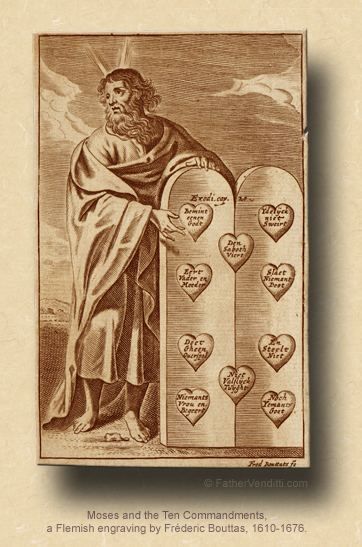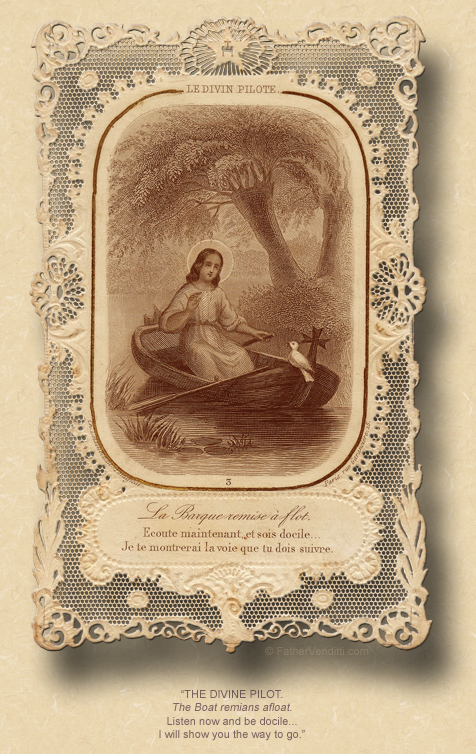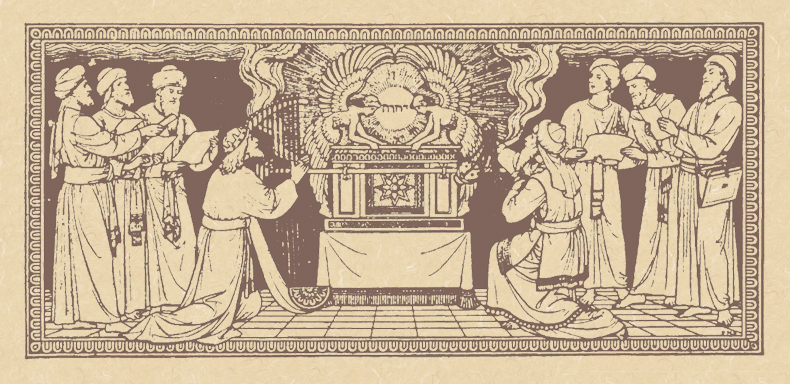The Parting of Friends, Part One.
The Fourth Sunday of Ordinary Time.
Lessons from the secondary dominica, according to the ordinary form of the Roman Rite:
• Deuteronomy 18: 15-20.
• Psalm 95: 1-2, 6-9.
• I Corinthians 7: 32-35.
• Mark 1: 21-28.
Septuagesima Sunday.*
Lessons from the dominica, according to the extraordinary form of the Roman Rite:
• I Corinthians 9: 24-27; 10: 1-5.
• [Gradual] Psalm Psalm 9: 1-11, 19-20.
• [Tract] Psalm 129: 1-4.
• Matthew 20: 1-16.
FatherVenditti.com
|
 8:15 AM 1/28/2018 — Most of you have heard by now that I will soon be leaving the Shrine to return to my home parish in Maryland in order to be closer to my family and, especially my mother as she enters the final stages of her earthly life and requires a lot of care. When I made that announcement last Sunday I didn’t know exactly when I would be leaving here, but now I do: I will be rolling out of her, moving van in tow, a week from Tuesday, on February 6th, which means my last Sunday here with you will be next Sunday, the 4th. The special things I want so much to share with you I will save for that day. In fact, I wrote that homily before I wrote this one because it weighed so heavily on my mind. 8:15 AM 1/28/2018 — Most of you have heard by now that I will soon be leaving the Shrine to return to my home parish in Maryland in order to be closer to my family and, especially my mother as she enters the final stages of her earthly life and requires a lot of care. When I made that announcement last Sunday I didn’t know exactly when I would be leaving here, but now I do: I will be rolling out of her, moving van in tow, a week from Tuesday, on February 6th, which means my last Sunday here with you will be next Sunday, the 4th. The special things I want so much to share with you I will save for that day. In fact, I wrote that homily before I wrote this one because it weighed so heavily on my mind.
But it’s almost a shame that today isn’t my last Sunday with you given that our first lesson is part of Moses’ farewell address to his people: “Moses spoke to all the people, saying: ‘A prophet like me will the Lord, your God, raise up for you from among your own kin; to him you shall listen’” (Dt. 18: 15 RM3). Not that I’m any kind of prophet like Moses or any other, but I kind of feel like him in his situation. The Chosen People were about to pass over into the land that God had promised them, and Moses wasn’t going with them. For forty years they had wandered in the desert after leaving Egypt, fighting many nations, often sinning in the Lord’s eyes, often losing faith and hope, often being rescued from almost certain destruction because of Moses’ intercession for them before God. Now the long journey was almost over, and the man who led them there was not going with them. The Five Books of Moses came to an end with Deuteronomy because Moses came to an end with Deuteronomy … at least as far as his earthly life was concerned. Moses would hand the rod given to him by God to Joshua, who would pass it on to a succession of leaders called the Judges, the last of them, Samuel, anointing Saul as the first King of Israel.
Israel’s transition from a tribe of nomads into a great kingdom was slow and difficult, and required many changes. All last week we had read from the First Book of Samuel at Holy Mass, and last Friday we heard the Prophet lament the desire of the people for a king so that they could be like other nations. God consents to the request of the people, but reluctantly, and the lesson I had passed on to those here that day was, “Be careful what you pray for.”  For a long time I had asked God to help me, to spare me from the almost weekly trips to Maryland to help my sister care for my mother, especially since during those brief visits I found there was little I could do except be there to lend moral support. This past year took a tremendous toll on both my health and my car. Last week, God answered my prayer, with a letter of appointment from the Cardinal-Archbishop of Washington appointing me to my native parish where I grew up, assigning me to care for the spiritual needs of the Catholic staff and patients of a large hospital near by. For a long time I had asked God to help me, to spare me from the almost weekly trips to Maryland to help my sister care for my mother, especially since during those brief visits I found there was little I could do except be there to lend moral support. This past year took a tremendous toll on both my health and my car. Last week, God answered my prayer, with a letter of appointment from the Cardinal-Archbishop of Washington appointing me to my native parish where I grew up, assigning me to care for the spiritual needs of the Catholic staff and patients of a large hospital near by.
As I said, be careful what you pray for, because God’s answer to my prayers requires me to leave so much and so many here that I have come to know and love. The Blessed Apostle Paul begins our Apostolic lesson today saying, “I should like you to be free from anxieties” (I Cor. 7: 32 RM3). I’ve never been good at that, and it seems that every time there’s a major change in my life I get sick; but, as much as I hate going to the doctor, I went yesterday since I can’t be sick next week when I move; and, sure enough, I’ve got a nasty sinus infection, so it was good that I went, as there’s so much to prepare and so much to do before a week from Tuesday comes and Two Men and a Truck show up to collect my worldly possessions.
In our Gospel lesson today, our Blessed Lord backs up the authority of His preaching with a good deed: He casts out an unclean spirit. But it was the remark made by those who saw it that’s most important about this passage: “‘What can this be?’ they asked one another. ‘What is this new teaching? See how he has authority…’” (Mark 1: 27 Knox), the moral of the story being that our Lord’s words became authoritative for them when they were reinforced by a Divine act of kindness. None of us can cast out unclean spirits—at least not that I’m aware of—but the analogy still holds: what we may say to others about our faith and our Church won’t mean much if those words aren’t accompanied by a life that’s lived in grace. The best preaching is always by example. So many people have been so kind in telling me how much they have appreciated my homilies here. Whether my words have been accompanied by a life and an example worthy of all the words I’m afraid to ask.
So, next Sunday I will preach to you for the last time, but let’s use this occasion today to ask our Blessed Lord to give us all the grace of letting our words of faith always flow forth from a life that speaks more loudly than words, a life that causes everyone we meet to think to themselves, “There goes someone who has read the life of Jesus Christ.”

* In the extraordinary form of the Roman Rite, today is the first day of the pre-Lenten season known as Septuagesima, named after the first of the three Sundays that comprise it. The purple of Lent is already worn, and the Gradual psalm is supplimented by an additional psalm called the Tract, with the Alleluia already suppressed. In English speaking countries, this season is sometimes called “Shrovetide,” because it ends on the Tuesday before Ash Wednesday, which is often called “Shove Tuesday.” A pre-Lenten season is preserved in every Christian Church that has a serious liturgical tradition, even the more traditional brands of the Anglican and Lutheran communions; in the Churches of the Byzantine Tradition, it's called the Triodion. It was eliminated in the ordinary form of the Roman Rite during the reforms following the Second Vatican Council, making the ordinary from the only major liturgical tradition not to observe it in some way.
|

